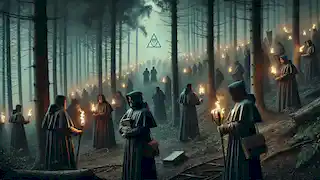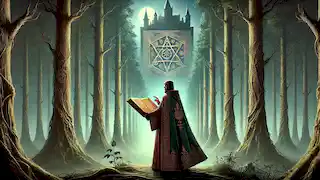In the deep forests of medieval Germany, a secretive brotherhood arose, shrouded in mystery, known only to the initiated as the Rosicrucians. These seekers of knowledge and truth held the belief that the world was governed not merely by political and military power, but by a hidden wisdom that could unlock the true potential of humanity. The Rosicrucians sought to unveil the secrets of the universe, combining philosophy, alchemy, and mysticism in their quest to enlighten the world. Their story weaves together an intricate web of secret meetings, hidden manuscripts, and an unshakable belief in the power of the mind to transcend the material world.
This is the story of their rise, their influence, and the mysterious forces that sought to either destroy them or preserve their secrets forever. In the year 1604, as Germany stood divided by political strife and religious conflicts, a small group of intellectuals began to gather in the city of Kassel. They were doctors, philosophers, and scientists, all disillusioned with the dominant religious dogmas of the time and intrigued by the possibilities of alchemy and the ancient mysteries of Egypt and the East. Led by a figure known only as Christian Rosenkreuz, they formed a brotherhood, dedicated to discovering the hidden truths of the universe. Christian Rosenkreuz, the enigmatic founder, was said to have traveled the world, from Egypt to Arabia, gathering the secrets of the ancient mystical traditions. Upon his return to Germany, he began to preach about the interconnectedness of all things, the unity of spirit and matter, and the potential for mankind to transcend the limitations of physical existence through spiritual enlightenment. His teachings, though radical, attracted a small but devoted group of followers. The brotherhood took the name “Rosicrucians,” symbolizing the rose and the cross—symbols of the fusion of divine and human, spirit and matter. The rose represented the secret knowledge of the divine, while the cross symbolized the suffering and material world that must be transcended to achieve enlightenment. The Rosicrucians believed that by understanding the principles of alchemy, not merely as a means to transmute metals but as a way to transform the human soul, they could achieve a form of spiritual immortality. This knowledge, however, had to be protected from those who would misuse it for personal gain or power. In 1614, the first of the famous Rosicrucian manifestos was anonymously published. Titled "Fama Fraternitatis," the manifesto described the life of Christian Rosenkreuz, his travels, and the establishment of the brotherhood. It called for a reformation of knowledge and science, urging intellectuals across Europe to abandon the rigid structures of the medieval scholastic system and embrace a new way of thinking. The "Fama Fraternitatis" was followed by the publication of the "Confessio Fraternitatis" in 1615, which expanded upon the ideas of the first manifesto and declared the brotherhood’s mission to be the spiritual enlightenment of all mankind. These writings sparked great curiosity across Europe. Scholars, philosophers, and alchemists began to seek out the Rosicrucians, hoping to uncover the secrets of their hidden knowledge. However, the brotherhood was elusive. The Rosicrucians did not openly reveal their identities or whereabouts, and many began to question whether they even existed at all. Were the Rosicrucians a real secret society, or simply a metaphor for the awakening of a new intellectual and spiritual age? Despite the doubts, the manifestos continued to captivate the imaginations of Europe’s intellectual elite. They spoke of an invisible college of enlightened minds who, through their knowledge of alchemy, astrology, and other esoteric sciences, could guide humanity toward a brighter future. The ideas of the Rosicrucians resonated particularly with those disillusioned by the Thirty Years' War that was ravaging Germany and much of Europe at the time. As the Rosicrucian manifestos spread across Europe, a network of like-minded intellectuals began to form. They corresponded in secret, sharing ideas about philosophy, alchemy, and mysticism, and often used coded language and symbols to communicate. This "Invisible College," as it was later called, laid the groundwork for the development of modern scientific and philosophical societies. Some historians believe that the Rosicrucians influenced the founding of the Royal Society in England, which became one of the most important scientific institutions in history. The ideals of the Rosicrucians—especially their emphasis on observation, experimentation, and the pursuit of knowledge for the betterment of humanity—echoed through the development of modern science. However, not everyone was enamored with the Rosicrucians. The Catholic Church, in particular, viewed the brotherhood’s ideas as heretical. The notion that individuals could seek spiritual enlightenment outside the authority of the Church was deeply troubling to the religious hierarchy, and efforts were made to suppress any teachings that seemed to align with Rosicrucian principles. Yet, the Rosicrucians had always intended to remain invisible. They never sought public recognition, and their influence continued to spread in the shadows, unseen by the authorities. One of the core beliefs of the Rosicrucians was that the true goal of alchemy was not to turn lead into gold, but to achieve spiritual transformation. The process of alchemical transmutation was symbolic of the inner transformation of the human soul—from base materialism to a state of spiritual purity. Christian Rosenkreuz had learned these principles during his travels in the East, where he had studied with the great alchemists and mystics of the time. He taught that each individual had within them a "divine spark" that could be awakened through a process of purification and spiritual practice. By aligning oneself with the hidden forces of the universe, one could transcend the limitations of the material world and achieve a state of higher consciousness. The Rosicrucians believed that the universe was governed by certain esoteric laws, which could be understood through the study of alchemy, astrology, and other mystical sciences. These laws revealed the interconnectedness of all things and the balance between opposites—light and dark, good and evil, spirit and matter. Understanding these laws allowed the Rosicrucians to tap into the hidden energies of the cosmos and manipulate them for the purpose of spiritual growth. The practice of alchemy also involved the study of nature and the elements. The Rosicrucians believed that by observing the natural world, one could discover the divine patterns that underlay all of creation. For them, nature was a reflection of the divine mind, and to study nature was to study the mind of God. As the 17th century progressed, the influence of the Rosicrucians began to wane. The publication of the manifestos had drawn attention to the brotherhood, but it also brought scrutiny from both religious and political authorities. Inquisitors began searching for members of the brotherhood, hoping to root out what they saw as a dangerous heresy. The Thirty Years’ War had also taken its toll on Germany, and many of the intellectuals who had been part of the Rosicrucian network were forced to flee or go into hiding. Some were arrested and tried for heresy, while others were executed. The surviving members of the brotherhood went even deeper into secrecy. They abandoned their public writings and communications, and the Rosicrucians became more of a myth than a reality. By the end of the 17th century, many believed that the Rosicrucians had ceased to exist altogether. Yet, their ideas lived on. The principles of alchemy and mysticism that they had championed found new life in the works of later philosophers, such as Isaac Newton and Gottfried Wilhelm Leibniz. The idea of an invisible college of enlightened minds continued to inspire those who believed that the pursuit of knowledge could lead to spiritual enlightenment. Though the Rosicrucians as an organized brotherhood may have faded from history, their legacy endured in the esoteric and intellectual traditions of Europe. The Freemasons, who emerged as a powerful secret society in the 18th century, drew heavily on Rosicrucian symbolism and ideas. The fusion of mysticism, alchemy, and philosophy that the Rosicrucians had advocated became a foundational element of many secret societies and mystical orders that followed. The Rosicrucians’ emphasis on individual spiritual enlightenment and the pursuit of hidden knowledge also influenced the development of the Enlightenment and the scientific revolution. Many of the great thinkers of the Enlightenment were inspired by the Rosicrucian ideal of a hidden wisdom that could guide humanity toward a brighter future. Today, the Rosicrucians remain an enigmatic figure in history. Some believe that the brotherhood still exists, operating in secret to this day, while others view them as a symbol of the intellectual and spiritual awakening that took place in Europe during the Renaissance and Enlightenment periods. Whether or not the Rosicrucians continue to exist in the shadows, their influence on the history of thought and spirituality cannot be denied. Their story is one of mystery, intrigue, and the eternal quest for knowledge.The Founding
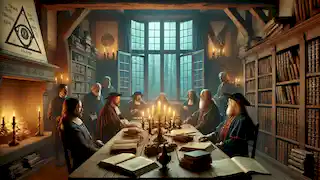
The Manifestos
The Invisible College
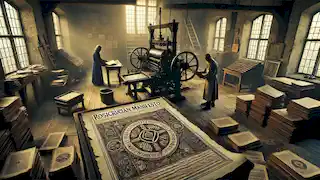
The Mysteries of Alchemy
The Brotherhood’s Decline
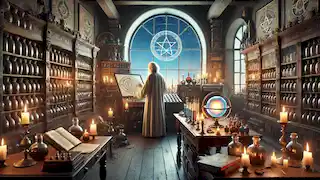
Legacy and Influence
